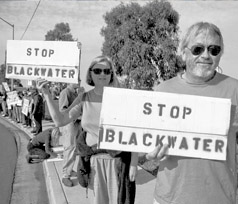
Blackwater Founder Tells of Extensive Government-Contracted Assassinations
Uana Kunichoff, truthout | Report
The head of Blackwater revealed the details of his collaboration with the CIA to locate and assassinate top al Qaeda operatives as part of a covert antiterror operation Tuesday, and blamed Democrats for the leak that ended the program.

(Photo: rjosef / Flickr)
In an article published in Vanity Fair, Erik Prince, the founder of Blackwater, spoke about the extent of his involvement with the CIA, which ranged from putting together, funding and executing operations to bring personnel into "denied areas" to targeting specific people for assassination who were deemed enemies by the US government.
Prince was one of a secret network of American citizens with special skills or access chosen to help the CIA access targets of interest. The program was kept secret for nearly eight years until it was revealed to lawmakers in a closed session with the House and Senate Intelligence Committee. During this meeting, CIA director Leon E. Panetta named both Prince and Blackwater as major players.
Prince blames Congressional Democrats for the leak. "[W]hen it became politically expedient to do so, someone threw me under the bus," he said. "The left complained about how [CIA operative] Valerie Plame's identity was compromised for political reasons. Well, what happened to me was worse. People acting for political reasons disclosed not only the existence of a very sensitive program but my name along with it."
According to current and former government officials, former Vice President Dick Cheney told CIA officers in 2002 that they did not need to inform Congress about the program because they were already legally authorized to kill al Qaeda leaders. Under an executive order signed by President Gerald Ford in 1976, the CIA was barred from carrying out assassinations. But President George W. Bush took the position shortly after 9/11 that killing al Qaeda members was comparable to killing enemy soldiers in battle, and therefore assassinations were permissible. Prince was hired in 2004.
A former Navy Seal, Prince said, "I've been overtly and covertly serving America since I started in the armed services." In his role as a contractor for the covert CIA program, according to The New York Times, Prince's Blackwater employees assembled and loaded Hellfire missiles and 500-pound laser-guided bombs onto remotely piloted aircraft – work previously performed by authorized and trained CIA employees.
Prince says he and a team of foreign nationals located a target for assassination in October 2008, but did not complete the job. He alleges two of these trips brought him and his team into Germany and Dubai - without the knowledge of their governments.
He further said that Blackwater resources were never used, but that he used his personal finances and was later reimbursed by the government. Prince has personally spent $45 million to finance a fleet of armored personnel carriers, and according to The Wall Street Journal, Blackwater itself had revenues of more than $600 million in 2008.
Blackwater, now renamed Xe Services for Xenon, the noncombustible gas, was founded in 1997 and has been in Afghanistan since 2002 and Iraq since 2003. In 2004, coalition forces in Baghdad declared private contractors, which included Blackwater employees, immune from Iraqi law.
Largely assigned to act as bodyguards for American diplomats and provide security for military and intelligence stations in Iraq and Afghanistan, Prince's employees have on more than one occasion been accused of wanton force, which has resulted in civilian deaths.
A shooting by Blackwater bodyguards in Baghdad in September 2009 resulted in the death of 17 civilians, and the Justice Department has since charged six people with voluntary manslaughter, among other offenses, calling the use of force both unjustified and unprovoked.
A contractor also shot and killed a man standing on a roadside, who later turned out to be a father of six, and a bodyguard who was assigned to protect Iraq's vice president. In both cases, the contractors were fired but not prosecuted.
Following these incidents, Iraqi officials have refused to give Blackwater an operating license. As a result of this, its revenue dropped 40 percent, and Prince says he is now paying more than $2 million a month in legal fees.
"We used to spend money on R&D to develop better capabilities to serve the US government," says Prince. "Now we pay lawyers."
The company is also facing a grand jury investigation and bribery accusations along with the voluntary-manslaughter trial of five ex-employees for Iraqis killed in September 2007.
American agencies have in the past outsourced interrogations , but many worry that the contracting out of the authority to kill brings a new set of problems.
Sen. Dianne Feinstein (D-Calif.), who leads the Senate Intelligence Committee, said. "It is too easy to contract out work that you don't want to accept responsibility for."
Blackwater, which received more than $1.5 billion in government contracts between 2001 and 2009, regularly offers its training area in North Carolina to CIA operatives and continues to help fly killer drones along the border between and Afghanistan and Pakistan – President Obama is said to have authorized more than three dozen of these hits.
Philip Alston, an Australian human-rights lawyer who has served as the United Nations Special Rapporteur on Extrajudicial, Summary, or Arbitrary Executions, said that drone attacks also operate in "an accountability void."
Prince said that until two months ago, he was still working on intelligence-gathering operations from an undisclosed location in America and coordinating the movements of spies who were working undercover in the Axis of Evil countries. However, Prince, who was rejected by the CIA when he applied for a position, now plans to curtail his work with Blackwater and teach economics and history in high school.
